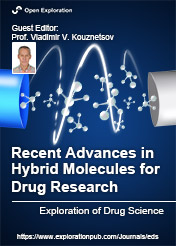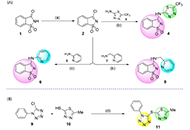-
 Special Issue Topic
Special Issue TopicRecent advances in hybrid molecules for drug research
Submission Deadline: March 31, 2025Guest Editor
Prof. Vladimir V. Kouznetsov E-Mail
Visiting Professor, Universidad del Atlántico, Barranquilla, Colombia
About the Special Issue
Over the last two decades, from the development of molecular hybridization concepts, the design and use of hybrid molecules have escalated uninterruptedly in developing new drugs to treat a number of key complex diseases such as cancer, tuberculosis, malaria, and neurodegenerative disorders. Born and developed on the pharmacology basis of the interaction of receptors and selective ligands (i.e., the bivalent ligand approach), the hybridization concept aids in identifying a hit and, subsequently, a lead structure for further development, improving considerably the design and discovery of novel drugs.
Combining together the pharmacophore subunits from known molecular structures of two or more with biological activities, structurally amalgamated molecular hybrids are found highly efficacious in overcoming the physicochemical, biological, and physiological shortcomings associated with the parent compounds and, more importantly, can shift the “multifunctional” drug discovery approach which might represent a promising alternative than the traditional “one molecule, one target” paradigm. Thus, with appropriate pharmacophoric moieties, hybrid molecules, which should call “multitarget-directed molecules,” aim to counter the complexities associated with the current drug development paradigm for delivering optimum.
Particular areas of interest include organic chemistry, medicinal chemistry, and biochemistry of potential drugs from hybrid molecules. This special issue entitled “Recent Advances in hybrid molecules for drug research” invites researchers to contribute with original research articles, commentary, perspective, and review articles related to all the aspects of the molecular hybridization approach and pharmacophore conjugation for improved drug design.
The submission of articles focused on any aspects of the subject, including studies of drug discovery in the early stages, such as the identification of new leads from the hybridization approach, in vitro, in vivo, and in silico physicochemical, pharmacological, and toxicological studies of hybrid molecules, is welcome.
Keywords: drug design; molecular hybridization approach; hybrid molecules; prodrugs; multiple-ligands; pharmacophores; pharmacophore conjugation
Call for Papers
Published Articles
 Hybrid azole-based conjugates as upcoming anticancer and antimicrobial agentsOpen AccessOriginal ArticleAim: This study discloses the synthesis and the antimicrobial and anticancer activities of four molecules of structural basis saccharin-thiadiazolyl (4), saccharin-pyridyl (6, 8), and tetrazole-t [...] Read more.Luís M. T. Frija ... Patrícia RijoPublished: November 23, 2023 Explor Drug Sci. 2023;1:420–434
Hybrid azole-based conjugates as upcoming anticancer and antimicrobial agentsOpen AccessOriginal ArticleAim: This study discloses the synthesis and the antimicrobial and anticancer activities of four molecules of structural basis saccharin-thiadiazolyl (4), saccharin-pyridyl (6, 8), and tetrazole-t [...] Read more.Luís M. T. Frija ... Patrícia RijoPublished: November 23, 2023 Explor Drug Sci. 2023;1:420–434
DOI: https://doi.org/10.37349/eds.2023.00028 -
-
Ongoing Special Issues
-
Completed Special Issues